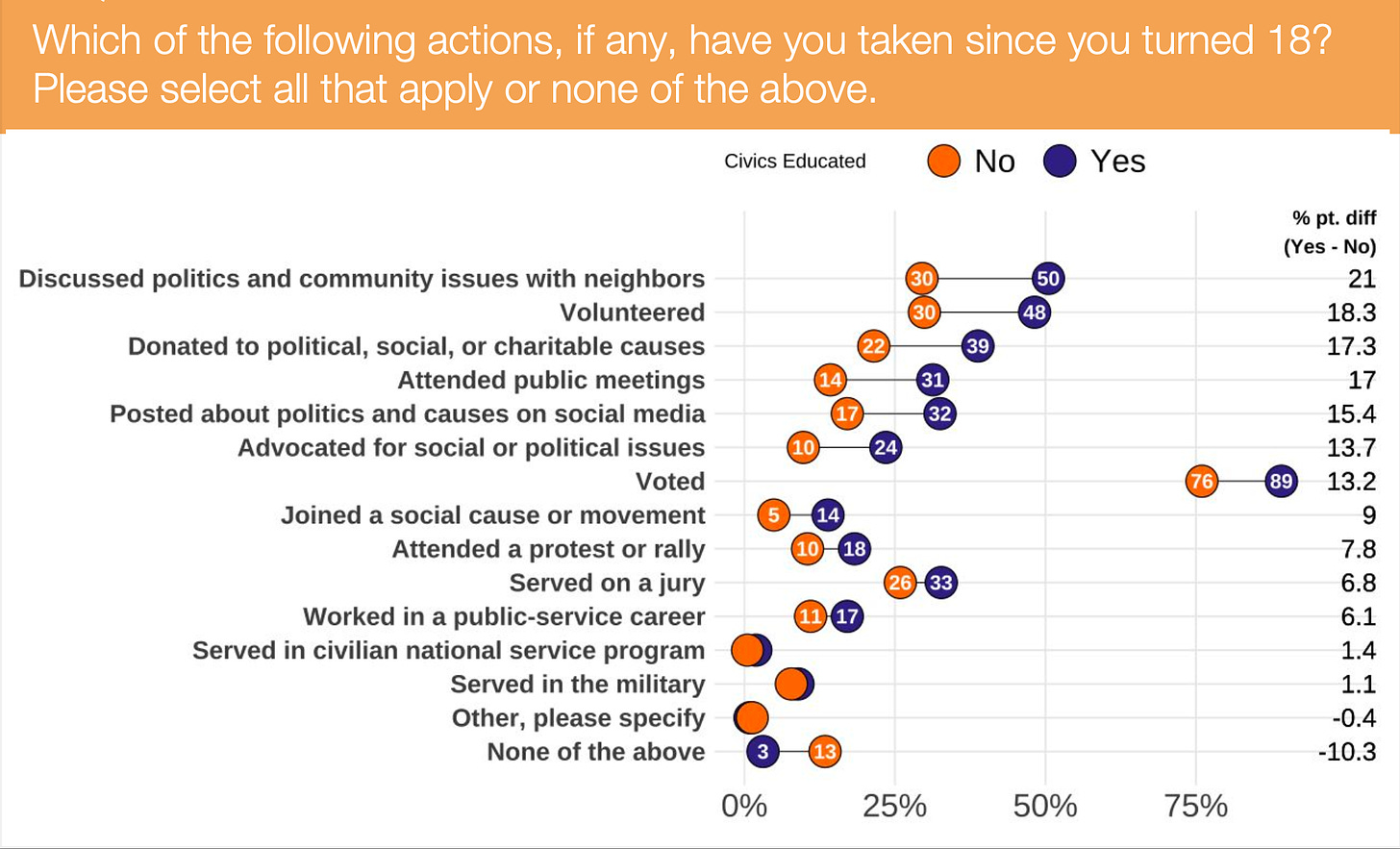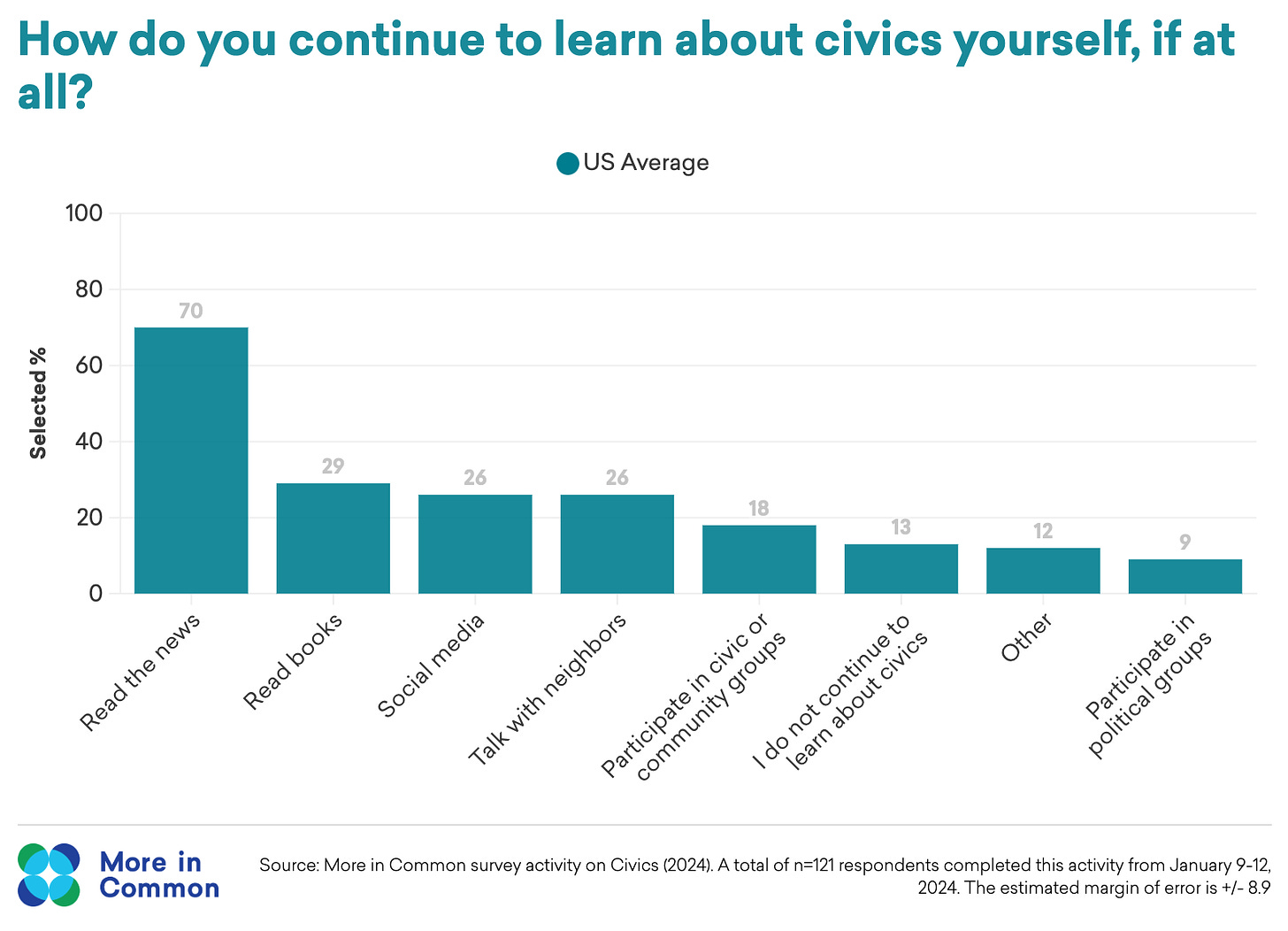Do Americans have civic role models?
Summary: More in Common recently conducted original qualitative research on Americans’ views on civics and whether Americans have a “civic role model.” Our findings, alongside other research, underscore how understanding civics and engaging in related activities is fundamental to a healthy democracy, and American life in general.
What is “Civics”?
Having a citizenry that understands and actively exercises its rights, duties, and responsibilities is critical for a functioning democracy. These duties and rights are often taught under the blanket term “civics.” When Americans hear the term “civics,” some may think of their social studies class in school. Others might think about it on a more conceptual level:
Civics to me, at its core, represents the morals and values that I feel should be shared by Americans, and [I believe we should] consider the values and consequences of the role that [civics] plays in various ways across many different life spectrums, not just within the confines of the concept of citizenship.
💬 Lily, Aged 35-44, White Woman, Politically Disengaged1
As Lily implies, it is hard to capture the definition of “civics” in a singular way. Many civic courses cover the foundations and structure of American government, the rights and responsibilities of citizens, and the electoral process more generally. Civics also includes active engagement—such as participating in activities like voting, serving on a jury, volunteering, and more. In these ways, civics encompasses various aspects of what it means to know and exercise the rights and responsibilities we have as citizens living in a democratic society.
Why Civics Matters
Research indicates that an understanding of civics is closely tied to various positive attitudinal and behavioral characteristics. Citizen Data and the Institute for Citizens and Scholars’ 2023 report “The Civic Outlook of Young Adults in America” finds a strong relationship between civic knowledge and civic engagement among young Americans (ages 18-24). Specifically:
The more young Americans know about civics, the more likely they are to be engaged in various aspects of the democratic process (i.e. voting).
The more likely a young American is to be civically engaged, the more likely they are to share a commitment to democracy.
The more engaged one is in their community, the more likely they are to have a higher satisfaction with democratic function.
The Philanthropy for Active Civic Engagement (PACE)—recently conducted a study showing that Americans who received civics education are more likely to be civically involved in a number of actions, such as voting, discussing politics and community issues with neighbors, and volunteering. In other words, Americans who are civically engaged are more likely to have had some educational background in civics.

While these findings are correlational, they point to an important insight: the more understanding Americans have of civics, the more likely they are to be better equipped to engage in functions necessary for a thriving democracy. As such, civics education serves as a cornerstone for building an informed and responsible citizenry and a more robust American democracy.
So what is Americans’ civic status?
New research, by More in Common and others, indicates that we have a reason to be concerned about the status of Americans’ civic disposition. The aforementioned Citizen Data and the Institute for Citizens and Scholars’ report found that 40% of young adults (ages 18-24) were able to correctly answer only one out of four civics questions. In addition, 35% of young adults (ages 18-24) say they do not feel informed enough to participate politically, and 33% indicated no intention to participate civically, even by voting, in 2024.
Furthermore, new research by Johns Hopkins University’s SNF Agora Institute published in Nature Human Behavior reveals that opportunities to participate in civic life are unevenly distributed across the country, with wealthier, whiter, and better-educated communities having more access.
This presents a challenge. Civics is inherently active: it requires engaging with other people and groups to identify, negotiate, and solve problems, or to otherwise shape and participate in civic life. Yet, for many if not most Americans, civics can seem like an abstract and individual enterprise—it is not a feature of their experience with other people, and they often lack someone to provide an example of how to engage as a citizen.
When we asked Americans questions about their experience with civics, we found similar trends. For example, when asked whether they have a civic role model, the most common answer is some version of "no."
Sadly, I do not have a role model in this area.
💬 Tyler, Aged 55-64, White Man, Moderate
No one to look up to in that area [of civics].
💬 Paul, Aged 45-54, Black Man, Passive Liberal
A select number of respondents who did indicate they had a role model were most likely to say a family member.
I would say my role model is first my mother and then my pastor. I learn a lot about civil rights, society, and what is going on in the world from my mother.
💬 Evelyn, Aged 45-54 Black Woman, Traditional Conservative
My mom is always my inspiration, and demonstrating good civic behavior is one of her role model traits.
💬 Yasenia, Aged 18-24, Hispanic Woman, Progressive Activist
Similarly, when asked about how they continue to learn about civics, American adults are more likely to say "read the news" than “participate in a community group.”
There is not a community or group that I am a part of where I regularly talk about or engage in civics. I'm not part of a group because I'm unaware of how to find those groups.
💬 Wyatt, Aged 35-44, White Man, Progressive Activist
No. I barely have time for hobbies outside of work and house chores, but I used to volunteer with an animal shelter group where we would bag food for homeless, food banks, seniors, etc. We had all sorts of discussions - politics, traveling, sports, etc. This group disbanded with Covid. We do have monthly dinners with our neighbor, and he was a police officer, so we do have good talks about current events, past events, etc.
💬 Jeanne, Aged 45-54 White Woman, Moderate
There is no group that I am a part of that regularly talks about or engages in anything that is solely focused on civics. I'm sure I've stumbled across posts or videos related to this though.
💬 Lily, Aged 35-44, White Woman, Politically Disengaged
Conclusion
A civically knowledgeable and engaged citizenry is foundational to a thriving democracy. As the research underscores, individuals—specifically younger Americans—actively involved in their communities often exhibit higher satisfaction with democracy, and those with a civics background are more engaged in democracy in general. However, a significant challenge emerges as many Americans lack opportunities for engagement in civics and, importantly, lack identifiable civic role models—or “civicians” as Ted Johnson writes in the Washington Post. Below are some recommendations for building more civically engaged communities:
Improve storytelling: Uphold stories of people working to build stronger communities. These can underscore the usefulness of civic engagement in local settings and inspire others to take part.
Build more collective settings: Create more spaces for people to engage with one another and to collectively work together to solve problems in their communities. These types of settings can help positively engage members of a community while fostering important problem-solving skills.
Invest in civics education: To increase access to and awareness of civics education, more accessible resources are needed for Americans to continue learning about civics in and outside of traditional education settings.
About Americans in Conversation
More in Common’s research cited in this newsletter comes from our Americans in Conversation (AIC) panel. AIC is a cutting-edge, mixed media, mixed methods research platform that enables testing of a wide range of content. At its core, it is a tool that helps More in Common US understand how to help increase social cohesion primarily through primarily qualitative study. It consists of a politically and demographically diverse and representative online community of about 150 Americans with whom we can engage continuously. We draw insights from the platform through analysis of participants’ video journaling, surveys, discussion groups and in-depth interviews.
Continuous engagement with participants allows us to ask questions, test ideas, and refine messaging guidance in response to real-time events. We’ve found that qualitative data is a powerful and underused way to both understand and present the views of Americans. The rich quotes and long-form thoughts of Americans on various issues are vital for gaining a deeper understanding of people’s underlying beliefs.
If you are interested in learning more about our AIC panel, and how it could be used to meet your research goals, please reach out to us at us@moreincommon.com.
Methodology
From January 9-12, 2024, More in Common conducted a focus-group type of activity with online respondents, asking them a mix of close- and open-ended questions about civics. A total of n=121 respondents completed these activities. In this activity, we defined “civics” as “the study of the rights and duties of citizenship.” Quotations from those conversations with respondents are included in this report. Where provided, names have been changed to protect privacy. Grammar and punctuation have been lightly edited for clarity.
Support our work by making a donation.
Click “Donate” or contact us at fundraising@moreincommon.com.
📩 Know someone who may enjoy our newsletter? Have them sign up here.
In addition to demographic information, we include the corresponding “Hidden Tribe” (Progressive Activist, Traditional Liberal, Passive Liberal, Politically Disengaged, Moderate, Traditional Conservative, and Devoted Conservative) for our qualitative research participants. Check out Hidden Tribes to learn more about our segmentation.



